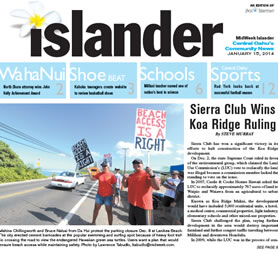Sierra Club Wins Koa Ridge Ruling
Sierra Club has won a significant victory in its efforts to halt construction of the Koa Ridge development.
On Dec. 2, the state Supreme Court ruled in favor of the environmental group, which claimed the Land Use Commission’s (LUC) vote to reclassify the land was illegal because a commission member lacked the standing to vote on the issue.
In 2007, Castle & Cooke Homes Hawaii asked the LUC to reclassify approximately 767 acres of land in Waipio and Waiawa from an agricultural to urban district.
Known as Koa Ridge Makai, the development would have included 5,000 residential units, a hotel, a medical center, commercial properties, light industry, elementary schools and other mixed-use properties.
Sierra Club challenged the plan, saying further development in the area would destroy important farmland and further congest traffic traveling between Mililani and downtown Honolulu.
In 2009, while the LUC was in the process of considering the reclassification, commissioner Duane Kanuha’s first term expired, but he continued to serve as a “holdover” member.
On April 26, 2010, the Senate rejected Kanuha’s nomination for a second term as commissioner after determining he lacked the knowledge and experience to qualify as the designated member with expertise on Hawaiian land usage.
At that time, Sierra Club filed an action to disqualify Kanuha from serving and to invalidate any actions he had taken with respect to the Koa Ridge development.
State rules allow commissioners to serve past their termination date and to “holdover” until a replacement commissioner is nominated.
Sierra Club director Robert Harris said holdovers can serve as long as two years, but because Kanuha lacked the qualifications for the position, he could not serve as a holdover member. The court agreed.
In the decision, the court ruled Kanuha was not a valid holdover member and that he did not qualify as a de facto member of the LUC because of the Senate’s rejection. Without Kanuha’s vote, the LUC would have failed to reach the required number of votes for reclassification.
The ruling does not completely halt development at the site. In 2011, Castle & Cooke refiled for a request for reclassification, and that request was approved in 2012.
Sierra Club challenged this second approval, saying it violates constitutional protections of important agricultural land. Harris expects the court to rule on this second suit in six to nine months.
If the court again rules in favor of Sierra Club, Koa Ridge still may get built if the county does not classify the area as important agricultural land.
The City & County of Honolulu has the ability to determine which land is critical to agricultural and which is not.
Property classified as “important agricultural land” cannot be re-designated. If the 767 acres are not listed as “important,” Castle & Cooke can refile its reclassification request. Bruce Barrett, Castle & Cooke executive vice president of residential operations, doesn’t believe the county will create such agricultural zones, and that the development plan is solid.
“The current appeal is based on a constitutional issue that doesn’t have anything to do with the LUC process and merits of the plan,” Barrett said.
“At no time in the land-use process have we not been given approval.”
Barrett said Castle & Cooke would wait until the court’s ruling to determine whether it will resubmit a proposal to reclassify the land and move ahead with the project.






